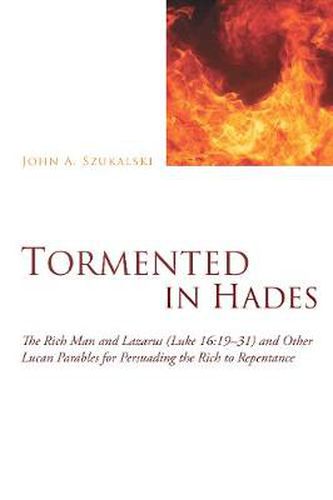Readings Newsletter
Become a Readings Member to make your shopping experience even easier.
Sign in or sign up for free!
You’re not far away from qualifying for FREE standard shipping within Australia
You’ve qualified for FREE standard shipping within Australia
The cart is loading…






This title is printed to order. This book may have been self-published. If so, we cannot guarantee the quality of the content. In the main most books will have gone through the editing process however some may not. We therefore suggest that you be aware of this before ordering this book. If in doubt check either the author or publisher’s details as we are unable to accept any returns unless they are faulty. Please contact us if you have any questions.
The parable of the Rich Man and Lazarus (Luke 16:19-31) seems to condemn the rich man to torments in Hades for no other apparent reason than his wealth and to reward poor Lazarus with bliss at Abraham’s side for no other apparent reason than his poverty. Is divine judgment simply a matter of eternal reward for the poor and condemnation for the rich, a mathematical function inversely proportional to one’s financial net worth? Or taken another way, is not the rich man’s prosperity a tangible sign of divine blessing for a life well lived, and the poor man’s misery an obvious sign of a divine punishment for a life of moral bankruptcy? But if this were true, then why would God reverse the eternal fates of these men upon their deaths? The parable of the Rich Man and Lazarus is one of seven money-lover parables in the Lucan Travel Narrative that addresses the issue of whether it is possible to be both rich and Christian–and if so, how so? When read utilizing the socio-narratological approach employed in this book, these parables come alive with new insights and implications for living a more authentic Christian discipleship.
$9.00 standard shipping within Australia
FREE standard shipping within Australia for orders over $100.00
Express & International shipping calculated at checkout
This title is printed to order. This book may have been self-published. If so, we cannot guarantee the quality of the content. In the main most books will have gone through the editing process however some may not. We therefore suggest that you be aware of this before ordering this book. If in doubt check either the author or publisher’s details as we are unable to accept any returns unless they are faulty. Please contact us if you have any questions.
The parable of the Rich Man and Lazarus (Luke 16:19-31) seems to condemn the rich man to torments in Hades for no other apparent reason than his wealth and to reward poor Lazarus with bliss at Abraham’s side for no other apparent reason than his poverty. Is divine judgment simply a matter of eternal reward for the poor and condemnation for the rich, a mathematical function inversely proportional to one’s financial net worth? Or taken another way, is not the rich man’s prosperity a tangible sign of divine blessing for a life well lived, and the poor man’s misery an obvious sign of a divine punishment for a life of moral bankruptcy? But if this were true, then why would God reverse the eternal fates of these men upon their deaths? The parable of the Rich Man and Lazarus is one of seven money-lover parables in the Lucan Travel Narrative that addresses the issue of whether it is possible to be both rich and Christian–and if so, how so? When read utilizing the socio-narratological approach employed in this book, these parables come alive with new insights and implications for living a more authentic Christian discipleship.